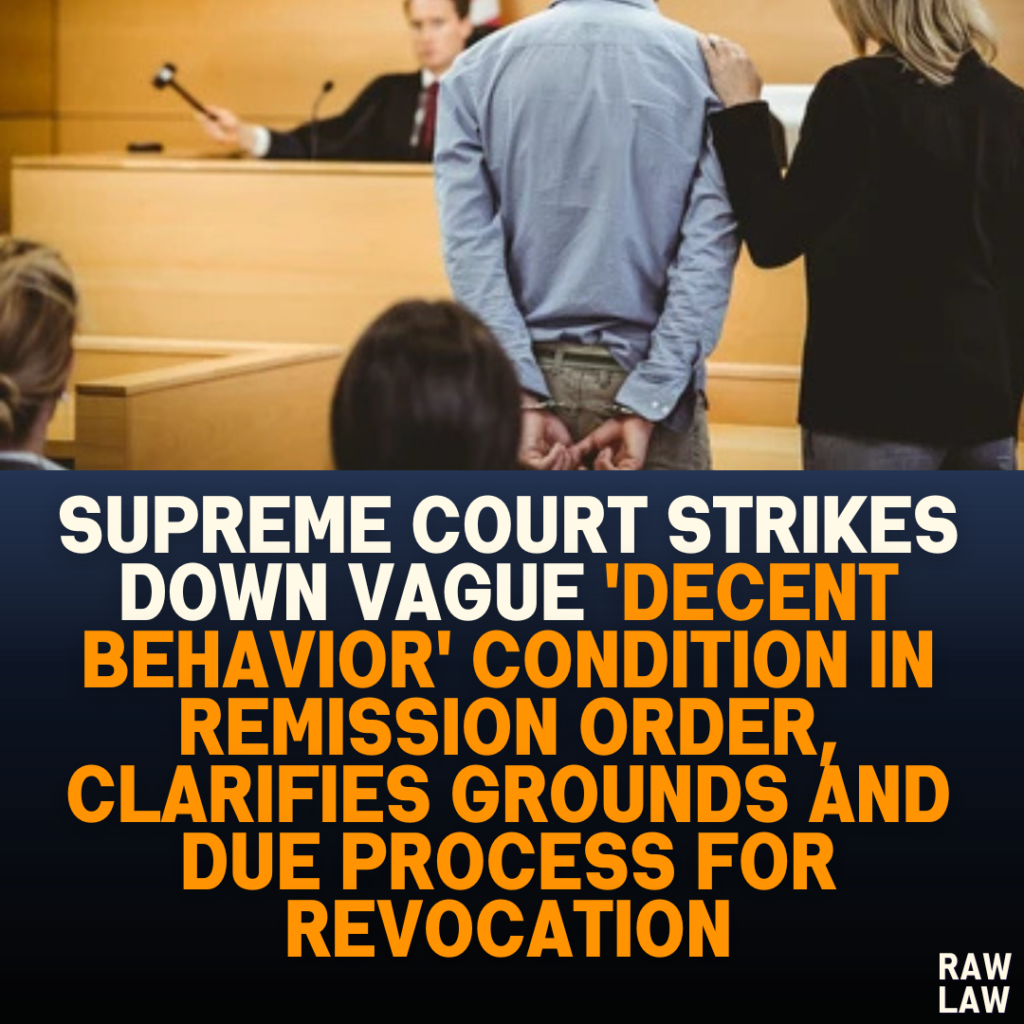Court’s Decision:
The Supreme Court partially allowed the appeal, striking down a condition in the remission order requiring the convict to “behave decently” for two years, deeming it arbitrary and vague. The Court also clarified that the remission could only be revoked after following the principles of natural justice, emphasizing the need for a show cause notice before any revocation.
Facts:
The appellant, convicted under Section 302 read with Sections 147 and 148 of the Indian Penal Code, 1860, was serving a life sentence since February 2008. His conviction had attained finality. On 15th September 2023, the Government of Gujarat granted him remission of the remaining sentence with four conditions, two of which were challenged. Specifically, the appellant was required to behave decently for two years post-release and avoid any cognizable offences, with automatic cancellation of remission if breached.
Issues:
- Whether the conditions imposed while granting remission, particularly the requirement to “behave decently” and avoid future offences, were legally valid.
- Whether the remission could be revoked automatically for breach of conditions.
Petitioner’s Arguments:
The petitioner contended that the condition to “behave decently” was vague and arbitrary, making it impossible to enforce due to its subjective nature. The petitioner also argued that the condition relating to future offences was harsh, as even false allegations could result in the automatic revocation of remission.
Respondent’s Arguments:
The State of Gujarat argued that the conditions imposed were lawful under Section 432 of the CrPC, asserting that remission is not a matter of right. The State maintained that conditions could be imposed to ensure public interest and prevent the convict from breaching the peace.
Analysis of the Law:
The Court examined Section 432 of the CrPC, which allows the government to grant remission either unconditionally or subject to reasonable conditions. It emphasized that such conditions must pass the test of Articles 14 and 21 of the Constitution, ensuring they are not arbitrary or unreasonable.
Precedent Analysis:
The Court referred to Shaikh Abdul Azees v. State of Karnataka, where it held that there is no automatic revival of the sentence upon breach of conditions. It also discussed V. Sriharan alias Murugan v. Union of India, emphasizing that the decision to grant remission must be fair, informed, and reasonable.
Court’s Reasoning:
The Court held that the term “decently” in the first condition was too vague and subjective, allowing arbitrary interpretation, thus violating Article 14 of the Constitution. It further clarified that remission could not be automatically revoked based on mere registration of a cognizable offence. A show cause notice and an opportunity to be heard must be provided before any cancellation of remission.
Conclusion:
The Court struck down the first part of condition no. 1 as arbitrary and clarified that remission could only be revoked in adherence to the principles of natural justice. It required that any action to revoke remission must be preceded by a show cause notice, allowing the convict to respond.
Implications:
This judgment reinforces the importance of clear and enforceable conditions in remission orders. It ensures that the power to revoke remission is exercised judiciously, following due process and not based on arbitrary or vague conditions.




Pingback: Jammu & Kashmir High Court Partially Sets Aside Auction Order, Citing Unintentional Breach of Auction Terms; Directs Refund of Forfeited Amount with 6% Interest in Case of Delay - Raw Law
Pingback: High Court of Orissa Rejects NEET Re-evaluation Petition, Emphasizes Limited Judicial Review in Absence of Manifest Error or Explicit Provision - Raw Law